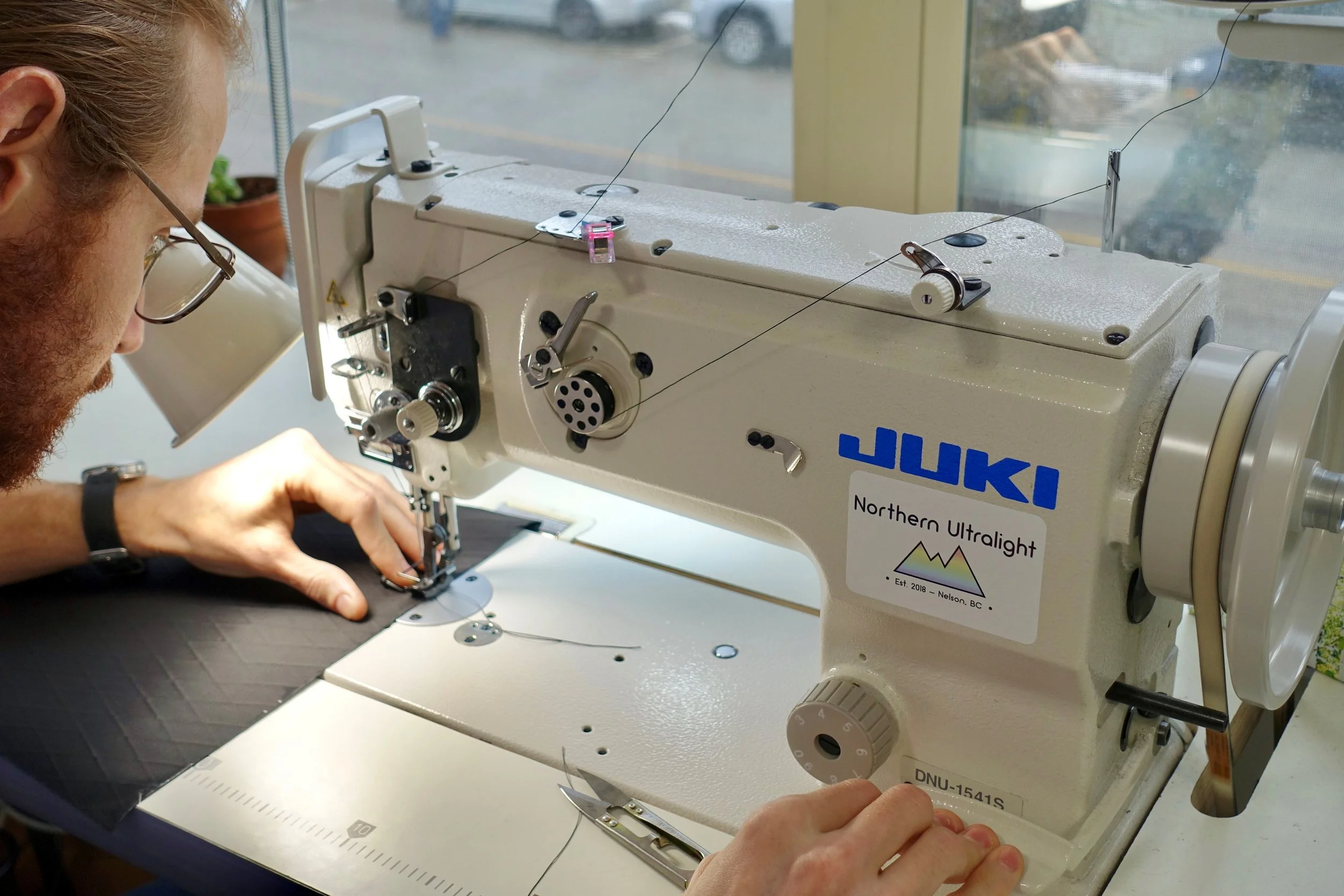When B.C. backs outdoor gear makers, everyone wins
When it comes to making the best ultralight hiking gear, Nelson does not have the factories of China, the labour force of Bangladesh, or the heritage of northern Italy. But it does have something none of those countries do: access to trails.
“The true test of outdoor gear is ‘Will it hold up in the wild?’” says Scott Matson, the founder and owner of Northern Ultralight, a manufacturer of lightweight backpacking gear. “You have to test the gear in the terrain and landscape it will be used in. Nelson has great access to rugged terrain.”
It’s why Northern Ultralight’s head office and factory are right in Nelson, the hub of B.C.’s Kootenay region. The city is surrounded by endless options for hiking. Matson can prototype an idea and test it the next day on hundreds of kilometres of trail in three different mountain ranges.
“I launched the business where I wanted to be,” he says.
Ask any of the hundreds of B.C.-based companies that make outdoor gear–from rugged RVs to fishing lures, snowmobile accessories to tents–and they will likely say something similar. The same landscapes and weather conditions that make the province an outdoor recreation Mecca are the same reasons it’s an ideal place to develop and produce outdoor gear.
But where B.C. is synonymous with world-class skiing, fishing, biking, snowmobiling and wildlife viewing opportunities, the gear manufacturing economy remains in the shadows. It is part of a greater outdoor recreation ecosystem that is starting to flex its muscles as an increasingly important sector in the province. Examples from the United States show that with a little targeted support, the outdoor recreation industry will rival many of the province’s largest resource sectors.
It’s already a powerhouse and likely more valuable than most people realize. No one tracks the outdoor recreation manufacturing economy in Canada. In the U.S., the federal Bureau of Economic Analysis measures what it calls the Outdoor Recreation Satellite Account, an inclusive measure of the outdoor recreation economy that lumps traditional activities like hiking and hunting as well as more urban activities like disc golf and gardening. It incorporates money spent on doing activities and travelling, as well as contributions from retail, events, apparel and gear manufacturing and amusement parks.
In 2023 it found the outdoor recreation economy generated US$1.2-trillion in economic output. In BC’s neighbour, Washington State, outdoor recreation contributes nearly three percent of the state’s GDP and employs more than 121,000 people.
It could easily be more valuable in British Columbia, where outdoor recreation is a key component of the $22-billion tourism industry. A 2017 estimate pegged visitors spending on adventure tourism at $2-billion a year.
In Squamish, Canada’s outdoor recreation capital, a 2020 economic analysis recognized the outdoor recreation maker economy as an emerging sector; it identified 188 in the recreation technology industry that together made $10-million in purchases in 2019. It was enough incentive for the District of Squamish in 2023 to create the Sea to Sky Outdoor Adventure Recreation Enterprise, or SOARE, to nurture and support the sector.
Modelled on the Kootenay Outdoor Recreation Enterprise, or KORE, both organizations create a space for mentoring, networking, skill building and learning opportunities. The annual KORE Outdoors Summit has become a gathering place for outdoor recreation makers from across Western Canada and the U.S.
In Squamish, SOARE is helping to grow the local outdoor recreation economy. There are now 123 members of SOARE, and the industry is growing. Local industry professionals attest that small outdoor recreation companies have seen healthy growth and larger firms are doing really well.
They have giants to look up to. Leading outdoor gear company Arc’teryx was founded in North Vancouver and still maintains its headquarters, design studio and a factory in the area. Part of its branding is its proximity to the harsh gear testing environment in its Coast Range backyard. The company recently set a goal of $5-billion in sales by 2030, more than double what it sold last year.
But while the potential is immense, the trail is steep. Without support the outdoor gear companies face a long slog with many blowdowns to climb over.
Earlier this year, a BC success story had to sell to one of its American customers. Kamloops’ We Are One Composites had established itself as a leading manufacturer of carbon mountain bike wheels. But it struggled to find enough room for its growing operations.
“At one point, we were using five different buildings just to get product out the door, frames, rims, management, assembly, it was all split up and being driven around town,” said Dustin Adams, the company founder and CEO, in an interview with PinkBike.
They struggled to climb the financial hill of growing to keep up with demand. In June, Adams announced its customer Industry Nine had purchased the company.
Production of We Are One products will remain in Kamloops, says Industry Nine, but some outdoor gear industry watchers say more government support could have helped Adams maintain ownership and support the provincial government’s own priorities.
In his January mandate letters, Premier David Eby directed ministers to: “Grow the economy by creating good jobs across British Columbia. We will collaborate with businesses, workers, and communities to attract investments in both new and traditional sectors as well as emerging sectors of the economy.”
To the Minister of Jobs and Economic Growth he went further, directing Ravi Kahlon to focus on several initiatives that could directly apply to outdoor gear makers, including:
In light of US threats to Canadian prosperity, lead work with colleagues to accelerate major investments in BC’s economy that create well-paying jobs.
Support the development and implementation of policies that increase economic growth in BC to improve opportunities for all British Columbians.
Continue to diversify BC’s economy and support good jobs through the BC Manufacturing Jobs Fund.
Continue to support small- and medium-sized businesses to innovate, grow and access global markets.
Make sure BC’s economy has the space to grow by creating an inventory of existing industrial lands, carrying out a land-use needs assessment and a strategy for protecting and growing the industrial land base.
Directing some of that attention towards outdoor gear makers and the greater outdoor recreation economy could have an outsized impact. The state of Colorado created a dedicated office to support its outdoor recreation industry in 2015. By 2019 its value had nearly tripled from $23-billion a year to $63-billion. It continues to outpace the rest of the state’s economy.
In other words, attention makes a big difference.
It’s the reason why long-distance backpackers love Northern Ultralight, too. Scott Matson obsesses over details and is constantly improving his products. Put a little provincial support behind people like that and there’s no telling how far they’ll go.

